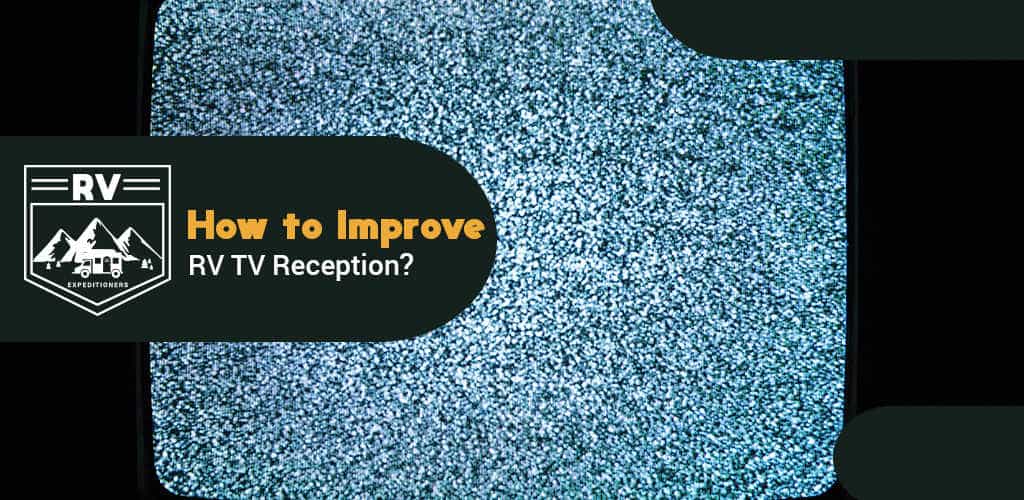Most of the time, when you’re traveling in an RV, the TV reception is so-so. You’ll probably have better luck streaming online videos than catching your favorite shows on your favorite broadcast channel.
Not all standard RV TV equipment is high-end. Sometimes you may need to tinker with it to make your RV experience feel more like home. Let’s find out how to improve RV TV reception.
Necessary Gadgets and Accessories
- TV tuner
- Pre-amplified TV antenna system
- Wire cutters
- Coaxial cable
- Wrenches
Step-by-Step Guide to Identify and Fix the Problem
Use HD Antennas
If you want the best video quality, you obviously can’t go for anything other than an HD antenna.
I recommend you have a look at my article about the best RV TV antennas here.
Rescan
Sometimes rescanning the programs may help fix your blurry images.
Check Antenna Placement
Raising the antenna may be very efficient when traveling in low altitude areas. If your RV doesn’t allow this, you may want to consider building a makeshift riser for it. Some people make these from PVC pipes which they can manually raise from inside the RV.
For satellite dishes, you need to ensure that the dish has a clear line of sight to the sky. You can either park elsewhere, rotate it, or remove some of the branches blocking its line of sight.
Use a Secondary Antenna
You may be able to use two HD antennas with a coupler in order to boost your signal. Keep one antenna oriented towards the weak broadcast tower and the other oriented towards a stronger broadcast tower. This is not guaranteed to work, though.
Use a TV Antenna Booster
A TV antenna booster is something you should always have in your RV. It works pretty much like a cell phone booster. It catches weak signals and amplifies them for the immediate vicinity.
Check for Nearby Stations
In some areas, the signal might be too weak to watch your favorite channels no matter what you do. However, you can always do an online search for local stations. They may not come up immediately on your rescans, but you can manually tune to the channel and see if the signal is good enough.
If you also find the broadcast towers, you can rotate your antenna towards it to boost your signal even more.
Consider a Pre-amplified TV Antenna System
If nothing seems to work, switching to a pre-amplified TV antenna system is also a good idea. These antennas can boost weak TV signals on their own. You’ll have to plug them in as they need a power supply.
Upgrade Your TV Tuner
If you have some cash to spare, consider investing in a new TV tuner. There are plenty of aftermarket options. It’s a fact that all modern TVs come with mediocre tuners (or none at all) as manufacturers expect most people to use external receivers/tuners (cable, satellite, Hulu, etc.) with the TV.
Re-Aim the Antenna
Where your antenna is facing is sometimes just as important as how high it is raised above your RV. Consider rotating it to see if you can pick up a better signal.
Protect Your Cables & Connections From Weather
Protect your connections and cables against UV rays, water, and even snow in order to stop bad weather from ruining your reception.
A broken or corroded cable, rusted screws, or faulty connectors need replacing. The process should be repeated once a year. Keep the weather out of your relaxing time by using moisture-proof tape. All worn cables should be replaced.
Check Coaxial Cable Integrity
Look for signs of fraying or rips on your coaxial cable. An RG6 coaxial cable is recommended for minimal signal loss when traveling with an RV.
Tips and Warnings
- Keep in mind that some RV parks may offer cable television hookups for the duration of your stay. That won’t fix your issues in the long run though
- Don’t start tinkering with your antenna system unless the warranty has expired or risk voiding the warranty
- Mind your surroundings when parking. Dense forest areas, tall buildings, mountains, and other obstructions may weaken the signal
Closing Thoughts
Don’t forget that in truly remote areas, you may have to use more than one of the previously mentioned tricks to get a decent signal. Therefore, managing your expectations is also a big part of taking on the RV camper lifestyle.

